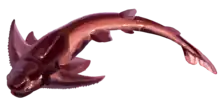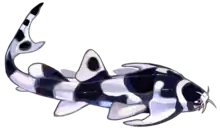| Kujdanowiaspis Temporal range: Early Devonian, | |
|---|---|
 | |
| Artist's reconstruction of K. buczacziensis | |
| Scientific classification | |
| Domain: | Eukaryota |
| Kingdom: | Animalia |
| Phylum: | Chordata |
| Class: | †Placodermi |
| Order: | †Arthrodira |
| Genus: | †Kudjanowiaspis Stensiö, 1942 |
| Species | |
| |
Kujdanowiaspis is an extinct genus of arthrodire placoderm fish from the Early Devonian of Podolia (Ukraine), Poland and Spain.[1][2][3] Kujdanowiaspis is known from many fragmentary head shields and body armours.[4]
Classification

Kujdanowiaspis consists of three species, all described in 1934: Kujdanowiaspis buczacziensis (type species), Kujdanowiapsis podolica, and Kudjanowiaspis rectiformis - although the independent status of K. rectiformis is in doubt, and is instead most likely K. podolica.[4][5][6] Kujdanowiaspis zychi was also named and described by Stensiö in 1945, but was reassigned to the new genus Erikaspis in 2007.[4][5]
Kujdanowiaspis is one of the more basal members of the order Arthrodira, as shown in the cladogram below:[7]
|
Actinolepidoidei
Phlyctaeniina |
Description
Because of the poor preservation of Kujdanowiaspis fossils, little is known about its physiology. What is known about it is typical of actinolepid placoderms, and it can compared to the better known primitive arthrodires such as Dicksonosteus or Actinolepis. It had a very pronounced, serrated spinal plate, giving it an almost lunate dorsal silhouette.[4]
The body of Kujdanowiaspis is slightly wider than high, with large spinal plates protruding laterally, suggesting a benthic lifestyle. The body armour of the genus Erikaspis is much flatter.[5]
Its jaws were comparatively underdeveloped in comparison to the more robust-jawed arthrodires that would come after it, such as Dunkleosteus and Coccosteus, indicating that it likely subsisted primarily on smaller, softer-bodied animals such as mollusks or worms instead of larger, tougher prey animals.
References
- ↑ Dupret, Vincent; Carls, Peter; Martínez-Pérez, Carlos; Botella, Héctor (2011-10-01). "First Perigondwanan record of actinolepids (Vertebrata: Placodermi: Arthrodira) from the Lochkovian (Early Devonian) of Spain and its palaeobiogeographic significance". Palaeogeography, Palaeoclimatology, Palaeoecology. 310 (3): 273–282. doi:10.1016/j.palaeo.2011.07.019. ISSN 0031-0182.
- ↑ Dupret, Vincent; Blieck, Alain (2009-01-01). "The Lochkovian–Pragian boundary in Podolia (Lower Devonian, Ukraine) based upon placoderm vertebrates". Comptes Rendus Geoscience. 341 (1): 63–70. doi:10.1016/j.crte.2008.09.007. ISSN 1631-0713.
- ↑ Szrek, Piotr; Dupret, Vincent (2017). "Placoderms from the Early Devonian "placoderm sandstone" of the Holy Cross Mountains, Poland with biostratigraphical and palaeobiogeographical implications". Acta Palaeontologica Polonica. 62. doi:10.4202/app.00395.2017. hdl:1885/204872.
- 1 2 3 4 Dupret, Vincent (2010). "Revision of the genus Kujdanowiaspis Stensiö, 1942 (Placodermi, Arthrodira, "Actinolepida") from the Lower Devonian of Podolia (Ukraine)". Geodiversitas. 32 (1): 5–63. doi:10.5252/g2010n1a1. S2CID 129505974.
- 1 2 3 Dupret, Vincent; Goujet, Daniel; Mark-Kurik, Elga (2007). "A New Genus of Placoderm (Arthrodira: 'Actinolepida') from the Lower Devonian of Podolia (Ukraine)". Journal of Vertebrate Paleontology. 27 (2): 266–284. ISSN 0272-4634.
- ↑ Dupret, Vincent; Sanchez, Sophie; Goujet, Daniel; Ahlberg, Per Erik (7 Feb 2017). "The internal cranial anatomy of Romundina stellina Ørvig, 1975 (Vertebrata, Placodermi, Acanthothoraci) and the origin of jawed vertebrates—Anatomical atlas of a primitive gnathostome". PLoS One. 12 (2): 266–284. doi:10.1371/journal.pone.0171241. PMC 5295682. PMID 28170434.
- ↑ Dupret, V.; Zhu, M. I. N.; Wang, J. N. Q. (2009). "The morphology of Yujiangolepis liujingensis (Placodermi, Arthrodira) from the Pragian of Guangxi (south China) and its phylogenetic significance". Zoological Journal of the Linnean Society. 157: 70. doi:10.1111/j.1096-3642.2009.00519.x.






